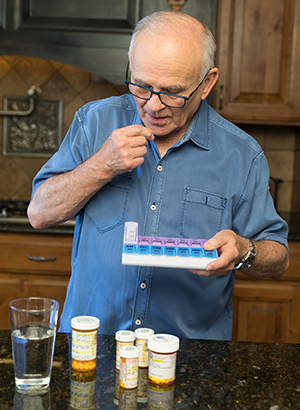Tips for Taking Medicines
It’s easy to forget to take your medicine, especially when you take a lot of pills. But, to get the best results from medicines, always take them as directed. The tips on these pages can help you keep track.
 |
| A pill organizer can help you keep track of the medicines you take each day. |
Staying on schedule
Every medicine has a different purpose. So, each one needs to be taken as prescribed. Don’t skip pills or stop taking a medicine, even when you feel fine. To stay on track, try to:
-
Take your medicine at set times. You could take it each morning with breakfast or right before you go to bed. Some medicines may need to be taken at certain times of the day, or with food. Ask your healthcare provider if this is the case for any of your medicines.
-
Find ways to remind yourself to take medicine. Use a pillbox or organize pills for the week. Set your watch or cell phone alarm to go off when you’re supposed to take your medicine. Or, put a note on the bathroom mirror to remind yourself.
-
Have your prescriptions refilled while you still have plenty of pills left. Keep in mind that certain suppliers, such as mail-order pharmacies, may take longer to fill prescriptions.
-
When traveling, keep all medicines in your carry-on bag. This way, you’ll have them in case you and your checked luggage get separated. Also, bring copies of each of your prescriptions when you travel.
-
Know when your medicine needs to be refilled so you don't run out. Using a medicine planner is a good way to see how many pills you have left. Writing a reminder on your calendar or setting an alert on your smart device such as your smartphone are other ways to make sure you don't run out.
Safety tips
Read the warning labels and usage instructions for each medicine you take. Also, keep these safety tips in mind:
-
Get help organizing your pills if you need it. Taking more than one medicine can be confusing. A family member or friend can help prevent you from making a mistake that could be dangerous to your health.
-
Fill all your prescriptions at the same drug store. This way, your records are all in one place.
-
Ask your pharmacist or healthcare provider for a “fact sheet” or other patient information when you start a new medicine.
-
Tell your healthcare provider and pharmacist if you have allergies to any medicine.
-
Don’t split your pills to save money. Talk to your healthcare provider if you’re having trouble paying for your medicine.
-
Never share medicine with anyone.
-
Ask your pharmacy how you should dispose of old or expired medicine.
-
Give a copy of your medicine list to a family member or close friend. Hold copies of each other’s lists in case of emergency.
-
Store medicines in a cool, dry, dark place. Don't store them in a steamy bathroom.
-
Make sure you tell your healthcare providers if you are taking any other supplements or over-the-counter medicines.
When adding a new medicine
Review all your medicines regularly with your healthcare provider. When you need to take a new medicine, ask questions such as:
-
Is there another way to treat my condition?
-
Do I really need any other medicine?
-
How long should I expect to take each medicine?
-
Are there medicines I'm taking now that I no longer need?
If you have side effects
Some medicines can cause side effects, such as nausea or dizziness. Tell your healthcare provider if you have any side effects. They may change the dosage or schedule to reduce effects. Be sure to keep taking your medicine as directed, and always talk to your healthcare team about how you feel. Your feedback will help the healthcare provider find the best medicine plan for you.